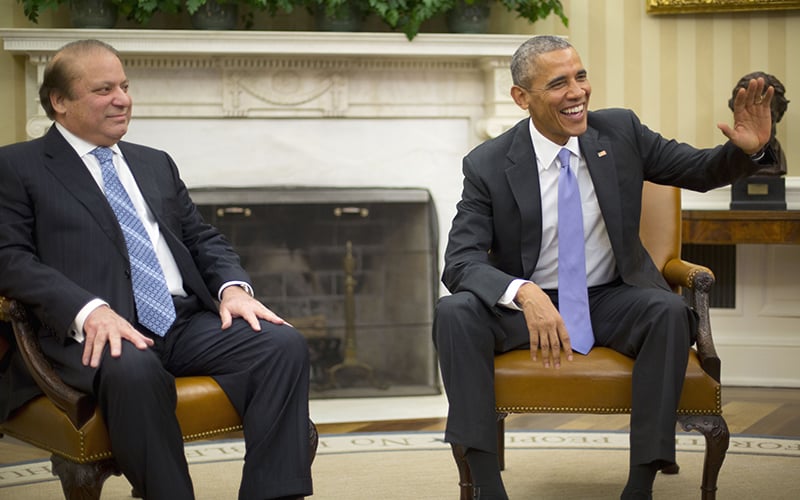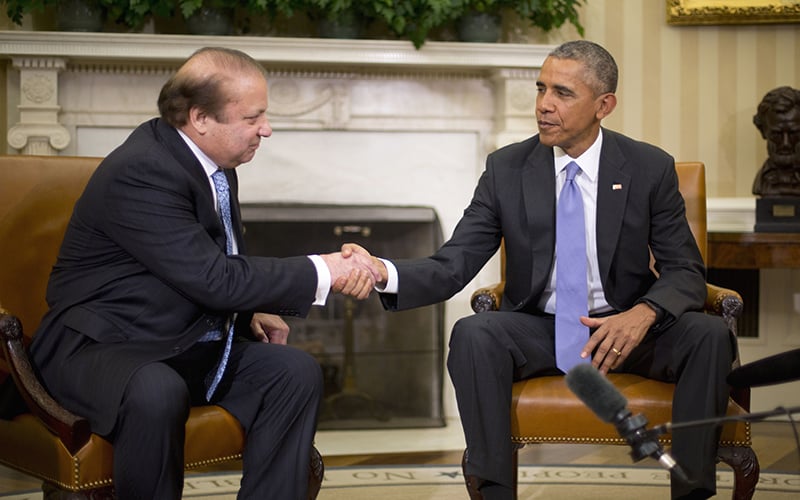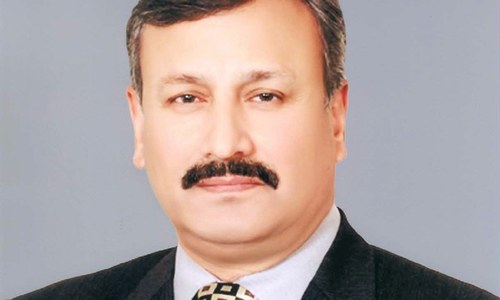Nawaz-Obama meeting: Agreement to act effectively against all terrorist groups



WASHINGTON: After an unusual, two-hour long meeting between Prime Minister Nawaz Sharif and US President Barack Obama, the United States and Pakistan agreed on Thursday to take effective action against all terrorist groups, including Lashkar-e-Taiba.
According to a joint statement issued after the meeting, Pakistan also agreed to ensure that all Taliban groups, including the Haqqani Network, “are unable to operate from the soil of Pakistan.”
The two leaders expressed concern over violence along the Line of Control, and noted their “support for confidence-building measures and effective mechanisms that are acceptable” to both India and Pakistan.
President Obama and Prime Minister Sharif discussed “the continuing threat of nuclear terrorism” as well, although there was no mention of a nuclear deal that media in both Pakistan and the United States speculated about.
Prime Minister Sharif reiterated Pakistan’s firm resolve not to allow any ISIS/Daesh (the so-called Islamic State) footprint in Pakistan.
Pakistan to ensure that Taliban, including the Haqqani Network, are unable to operate from its soil
The leaders emphasised the importance of a sustained and resilient dialogue process between India and Pakistan, which should aim at resolving all outstanding territorial and other disputes, including Kashmir.
These disputes should be resolved “through peaceful means and working together to address mutual concerns of India and Pakistan regarding terrorism”, the statement said.
Prime Minister Sharif apprised Mr Obama about Pakistan’s resolve to “take effective action against UN-designated terrorist individuals and entities, including Lashkar-e-Taiba and its affiliates, as per its international commitments and obligations under UN Security Council resolutions and the Financial Action Task Force,” the statement added.
President Obama and Prime Minister Sharif reaffirmed that a mutual commitment to democracy was a key pillar of the US-Pakistan partnership. “President Obama commended Prime Minister Sharif’s leadership in strengthening and consolidating Pakistan’s democratic institutions.”
President Obama condemned the December 2014 terrorist attack by the Tehreek-i-Taliban Pakistan in which 140 school children were killed.
The leaders discussed the importance of continued cooperation against terrorists and violent extremist groups.
President Obama affirmed Pakistan’s role as a key counter-terrorism partner and recognised the sacrifices that Pakistani civilians, military and law-enforcement personnel have made over the years while confronting terrorism and militant groups.
President Obama expressed particular appreciation for Pakistan’s ongoing support to degrade and ultimately defeat Al Qaeda and its affiliates, noting that this partnership had helped to decimate the group’s leadership and operational capacity and had disrupted plots against the US homeland.
President Obama also honoured the sacrifices of the Pakistani security forces in Operation Zarb-i-Azb and other operations, which have degraded the ability of militants to plan and execute terrorist attacks and noted further steps being taken in this regard in line with the National Action Plan.
President Obama and Prime Minister Sharif renewed their common resolve to promote peace and stability throughout the region and to counter all forms of extremism and terrorism.
Afghan reconciliation process
Both leaders expressed their commitment to advance an Afghan-owned and -led peace and reconciliation process between the Afghan government and the Afghan Taliban, and called upon Taliban leaders to enter into direct talks with Kabul and work towards a sustainable peace settlement.
President Obama commended Pakistan for hosting and facilitating the first public talks between the Afghan government and the Taliban in July 2015 and highlighted the opportunity presented by Pakistan’s willingness to facilitate a reconciliation process that would help end insurgent violence in Afghanistan.
Prime Minister Sharif reaffirmed that Pakistan’s territory “will not be used against any other country and noted that this is an obligation of all countries in the region”.
Both leaders affirmed that regional peace and stability required the prevention of attacks across the Pakistan-Afghanistan border.
The prime minister outlined the actions that Pakistan was taking under the National Action Plan to ensure that the Taliban — including the Haqqani Network — are unable to operate from the soil of Pakistan. The leaders reaffirmed that coordinated management of the Pakistan-Afghanistan border and orderly return of Afghan refugees from Pakistan were fundamental to enhancing security.

President Obama and Prime Minister Sharif stressed that improvement in Pakistan-India relations would greatly enhance prospects for lasting peace, stability and prosperity in the region.
Acknowledging the ongoing critical counter-terrorism efforts that have driven the robust US-Pakistan security cooperation since September 11, 2001, the leaders affirmed that this security relationship had been and would continue to be integral to regional stability. Both leaders noted that the stability of South Asia depended on cooperation among all neighbours to suppress all extremist and militant groups operating in the region.
Highlighting the quickly evolving extremist landscape from the Sahel to South Asia, the president and the prime minister noted with satisfaction that the United States and Pakistan were working closely to counter emerging terrorist groups such as the self-styled Islamic State/Daesh in South Asia. The leaders also reiterated their commitment to combat the extremist ideology that propelled such groups.
President Obama raised his concern regarding the US nationals being held hostage by terrorist groups in the region. The prime minister indicated that Pakistan would assist in every way possible with the safe return of American and other hostages.
Defence cooperation
President Obama noted Pakistan’s positive efforts to counter improvised explosive devices and both leaders resolved to continue working together to disrupt the threat posed by these devices.
They recognised that a stable and peaceful Pakistan-Afghanistan border was important for the success of counter-terrorism, counter-insurgency and counter-IED efforts. They also underscored the critical significance of effective border coordination mechanisms between Pakistan and Afghanistan in achieving these objectives.
The two leaders reaffirmed that the defence consultative group mechanism had been critical in stimulating defence partnership and resolved to explore new avenues of enhancing defence collaboration.
Strategic stability
President Obama and Prime Minister Sharif recognised the shared interest in strategic stability in South Asia. The two leaders underscored that all sides should continuously act with maximum restraint and work jointly towards strengthening strategic stability in South Asia. They acknowledged the importance of regional balance and stability in South Asia and pursuing increased transparency and uninterrupted dialogue in support of peaceful resolution of all outstanding disputes.
Nuclear security
The United States and Pakistan committed to work together to make the Nuclear Security Summit hosted by President Obama next year a success. President Obama welcomed Pakistan’s constructive engagement with the Nuclear Security Summit process and its cooperation with the International Atomic Energy Agency and other international forums.
The leaders noted Pakistan’s efforts to improve its strategic trade controls and enhance its engagement with multilateral export control regimes. Recognising the importance of bilateral engagement in the Security, Strategic Stability and Non-Proliferation Working Group, the two leaders noted that both sides would continue to stay engaged to further build on the ongoing discussions in the working group.
Published in Dawn, October 23rd, 2015
On a mobile phone? Get the Dawn Mobile App: Apple Store | Google Play
















































